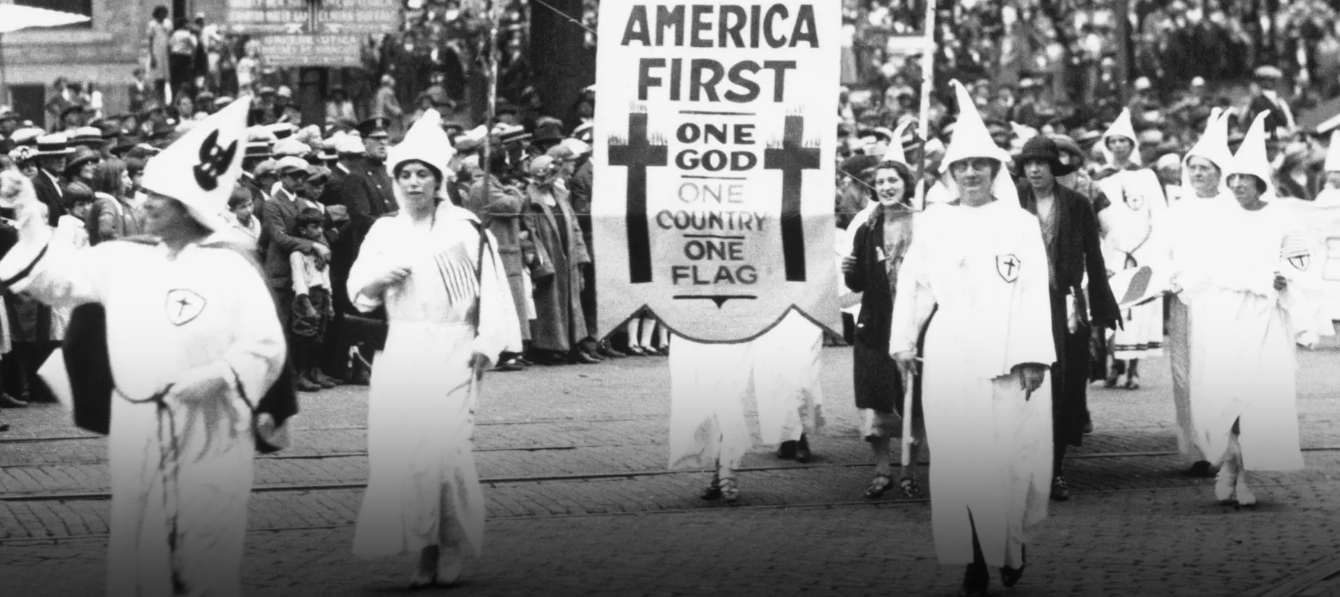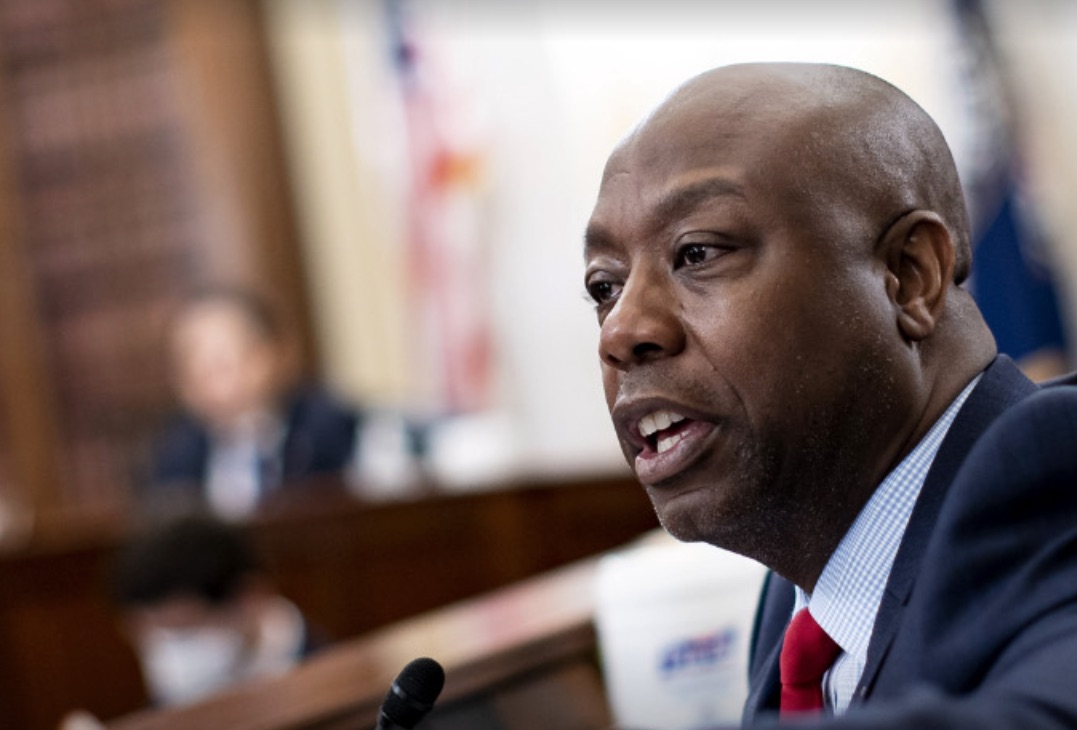

アメリカ合州國は人種差別國家か?
Are the United States people racists from the bottom of their hearts?


The
Klan's main targets were immigrants from southern and eastern Europe,
especially Catholic ones, ca.1920.// Tim Scott in present day.
☆COMMENTARY Is the United States a racist country? by Rashawn Ray May 4, 2021, Brookings.
︎・アメリカ合衆国における制度的人種主義▶︎︎制度的人種主義・体系的人種主義▶︎▶︎人種主義▶人種をめぐる用語集︎▶︎︎啓蒙思想の中に人種主義が潜んでいる▶カラー・ブラインドは本当に人種偏見から自由になれるか?︎▶科学人種主義︎︎▶DNAを種的差異を根拠にする人種主義の誕生︎▶︎︎▶︎
| ★South Carolina
Republican Sen. Tim Scott
shocked many people when, in response to President Joe Biden’s
congressional address, he stated that “America is not a racist
country.” He admitted that he himself had experienced “the pain of
discrimination,” and noted, “I know what it feels like to be pulled
over for no reason, to be followed around a store while I’m shopping.”
When asked on ABC’s Good Morning America the following day, Vice
President Kamala Harris seemed to agree with Scott when she said, “I
don’t think America is a racist country.” Yet immediately following
this sentence she quickly pointed out, “But we also do have to speak
truth about the history of racism in our country and its existence
today.”s |
サウスカロライナ
州選出の共和党上院議員ティム・スコットが、ジョー・バイデン大統領の議会演説を受けて「アメリカは人種差別主義者の国ではない」と発言し、多くの人々に
衝撃を与えた。彼は自分自身が「差別の痛み」を経験したことがあることを認め、「理由もなく車を止められたり、買い物中に店内をつきまとわれたりするのが
どんな気分か、私にはわかる」と述べた。翌日、ABCの『グッド・モーニング・アメリカ』で質問されたカマラ・ハリス副大統領は、「アメリカは人種差別主
義者の国ではないと思う」と答え、スコット氏に同意しているように見えた。しかし、その直後に彼女は、"しかし、私たちはまた、私たちの国における人種差
別の歴史とその今日の存在について真実を語らなければなりません "と指摘した。 |
| As
Soledad O’Brien said, “It sounds like a racist country to me,” in
response to Scott—but it seemingly applies to comments by Harris as
well. President Biden, who seemed to not pull any punches during his
speech, stated, “We have a real chance to root out systemic racism that
plagues America.” However, Biden appeared to walk back his remarks on
The Today Show to align more with Harris and Scott (to a certain
degree) by noting that slavery and Jim Crow laws had a
cost. |
ソ
レダッド・オブライエンがスコットに対して「私には人種差別主義者の国のように聞こえる」と言ったが、それはハリスのコメントにも当てはまるようだ。バイ
デン大統領は演説中、パンチを抜かない様子で、"アメリカを悩ます体系的な人種差別を根絶する本当のチャンスがある
"と述べた。しかし、バイデンは『トゥデイ・ショー』で、奴隷制度とジム・クロウ法には犠牲があったと指摘することで、ハリスとスコットに(ある程度)同
調するように発言を後退させたようだ。 |
| It
is almost as if simply saying America is not racist, but then turning
the other cheek and saying it is racist in subtler terms and that
racist things have been done to you makes it ok. It is confusing to
Americans and the international community. To supporters, these
comments are disappointing. To others, they were shocking. For me, the
cognitive dissonance of some of our elected leaders is real and
explainable. There is an oversimplification of racism in America,
because as sociologist Eduardo Bonilla-Silva notes, there can be systemic racism without racists.
|
単
にアメリカは人種差別主義者ではないと言いながら、反対側の頬を向けて、微妙な言葉では人種差別主義者であり、人種差別的なことをされてきたと言えば、そ
れがOKになるかのようだ。アメリカ人も国際社会も混乱している。サポーターにとっては残念なコメントだ。他の人々にとっては衝撃的だった。私にとって
は、選出された指導者たちの認知的不協和は現実的であり、説明可能だ。社会学者エドゥアルド・ボニーヤ=シルバが指摘するように、人種差別主義者なしでも
システミックな人種差別はあり得るのだから。 |
| When
a person critiques America for the racism that is deeply embedded in
our social institutions, some feel they are being personally attacked.
This is because deep down they realize that they benefit from unearned
assets associated with whiteness. Scott, Harris, and Biden recognize
this and try to balance these varying perspectives as they worry about
voters nationally and in a state like South Carolina. |
私
たちの社会制度に深く埋め込まれた人種差別についてアメリカを批判するとき、個人的に攻撃されていると感じる人がいる。それは、心の奥底で、白人であるこ
とに付随する得も言われぬ資産から利益を得ていることを自覚しているからだ。スコット、ハリス、バイデンはこのことを認識し、全国的な有権者やサウスカロ
ライナ州のような州の有権者を心配しながら、こうしたさまざまな視点のバランスを取ろうとしている。 |
| Recently,
a parent at a city council meeting had a meltdown when trying to
explain why she does not want critical race theory taught in her
children’s school. Florida Gov. Ron DeSantis said that systemic racism
as a concept is “a bunch of horse manure.” So, not only has Florida
made it legal to harm people protesting, but he banned teaching
critical race theory in schools. For a deeper dive on critical race
theory, people should read the work of sociologists Victor Ray and Ted
Thornhill, who lay out why DeSantis’ perspective is problematic.
|
最近、市議会で、ある保護者が、な
ぜ自分の子どもたちの学校で批判的人種論を教えてほしくないのかを説明しようとして、メロメロになってしまった。フロリダ州知事のロン・デサンティスは、
概念としての体系的人種差別は "馬糞の塊
"だと言った。つまり、フロリダ州は抗議する人々に危害を加えることを合法化しただけでなく、学校で批判的人種理論を教えることを禁止したのだ。批判的人
種理論についてより深く知るには、社会学者ビクター・レイとテッド・ソーンヒルの研究を読むべきだ。 |
| I
conducted research with Matt Hunt on what predicts who believes they
are middle class. For education, income, and occupational prestige,
Black people are less likely to identify as middle class compared to
whites with comparable levels of these socioeconomic outcomes. Why? It
is because social class is not just about what a person looks like on
paper, but how people experience social class in everyday life and the
deference that one receives for their socioeconomic status. Black
people are less likely to get that deference, while white people are
often afforded more. It is so commonplace for white people that some
cannot fathom living without it. This is because many white people,
particularly white people with lower levels of education and income,
realize that whiteness comes with a premium that extends beyond
economics to include cultural and social capital. As President Lyndon
Johnson said, “If you can convince the lowest white man he’s better
than the best colored man, he won’t notice you’re picking his pocket.
Hell, give him somebody to look down on, and he’ll empty his pockets
for you.” |
私
はマット・ハントと、自分が中流階級であると考える人を予測する要因について研究を行った。学歴、収入、職業的名声において、これらの社会経済的成果が同
程度の白人に比べ、黒人は中流階級であると自認する傾向が低い。なぜか?それは、社会階級とは書類上の外見だけでなく、人々が日常生活でどのように社会階
級を経験し、社会経済的地位に対してどのような敬意を払うかということだからである。黒人はそのような優遇を受けることが少ないが、白人はより多くの優遇
を受けることが多い。白人にとっては当たり前のことであり、それなしでは生きていけないと考える人もいるほどだ。なぜなら、多くの白人、特に教育水準や所
得の低い白人は、白人であることが経済的なものだけでなく、文化的・社会的資本を含むプレミアムを伴うことを理解しているからである。リンドン・ジョンソ
ン大統領が言ったように、「最下層の白人に、自分が最上の有色人種よりも優れていると思わせることができれば、彼はあなたが彼の懐を狙っていることに気づ
かないだろう。彼を見下すような人間を与えれば、彼はあなたのために自分のポケットを空っぽにするだろう」。 |
| Harris
and Scotts’ comments are puzzling at a broader level as well
considering how much of a collective memory their experiences with
racism are—Harris reliving her systemic experiences with bussing and
Scott recounting the nearly 20 times he has been pulled over by police,
where being an elected official potentially made the interaction
worse. |
ハリスはバッシングの制度的な経験を語り、スコットは20回近く警察に
車を止められたが、選挙で選ばれた公職者であることが、そのやりとりを悪化させた可能性があることを語っている。 |
| These
stories acknowledge that life is different if you are Black, and
unfortunately systemic racism seems to ripple through our social
institutions and into our daily social interactions, whether in
Congress or at a coffee shop down the street from the Capitol. These
types of experiences—racialized cuts and hurdles—have a cumulative
effect on health. Sociologists Pam Jackson and Jason Cummings’ research
documents that middle-class Blacks have worse health profiles than
working-class whites. They attribute this difference to the daily
racialized trauma experienced in predominately white environments like
work and neighborhood settings. |
こ
れらの物語は、黒人であれば人生が異なることを認め、残念ながら体系的な人種差別は、議会であれ議事堂から通りを隔てた喫茶店であれ、私たちの社会制度を
通じて、日々の社会的交流に波及しているようだ。このような人種差別的なカットやハードルは、健康に累積的な影響を与える。社会学者のパム・ジャクソンと
ジェイソン・カミングスの研究によると、中流階級の黒人は労働者階級の白人よりも健康状態が悪いという。彼らはこの違いを、職場や近隣環境といった白人が
多い環境で経験する日常的な人種差別的トラウマのせいだと考えている。 |
| Systemically,
we know that Black people compared to whites are more likely to attend
schools with less funding per student, less likely to obtain a job
because of our “Black-sounding” name or even when attending an Ivy
League university, less likely to obtain a home loan (even when having
the same credit score), have their homes appraised for equitable value,
more likely to experience pregnancy complications and maternal
mortality, and more likely to have contact with police and the criminal
justice system. |
シ
ステム的には、黒人は白人に比べて、学生一人当たりの資金が少ない学校に通う可能性が高いこと、「黒人っぽい」名前のために仕事を得る可能性が低いこと、
あるいはアイビーリーグの大学に通う可能性が低いこと、住宅ローンを組む可能性が低いこと(クレジットスコアが同じでも)、公平な価値で家を査定してもら
えないこと、妊娠合併症や妊産婦死亡率を経験する可能性が高いこと、警察や刑事司法制度と接触する可能性が高いこと、などがわかっている。 |
| Systemic
racism inhibits (rather than prohibits like in the past) people’s
ability to actualize all aspects of the American Dream. This
occurs even for highly-educated Black people with high incomes and no
criminal record. In fact, research documents that white people with a
criminal record are more likely to get called back for a job than Black
people without one. |
シ
ステム化された人種差別は、人々がアメリカン・ドリームのあらゆる側面を実現する能力を(かつてのように禁止するのではなく)阻害している。
これは、高収入で犯罪歴のない、高学歴の黒人にさえ起こることである。実際、犯罪歴のある白人の方が、犯罪歴のない黒人よりも、仕事のために呼び戻される
可能性が高いという調査結果もある。 |
| Research documents that hard
work (or lack thereof), intellect, or criminality do not explain these
outcomes. Instead, it is the racism embedded deeply within our social
institutions’ policies, rules, regulations, and laws that segment
people’s experiences along racial lines. It is the same for gender.
Women can achieve but have a much harder time doing so. If not, America
would have had a woman vice president and speaker of the House sitting
behind the president long before 2021. |
研究によれば、勤勉さ(またはその欠如)、知性、犯罪性は、こうした結
果を説明するものではない。むしろ、私たちの社会制度の政策、規則、規制、法律の中に深く埋め込まれた人種差別が、人々の経験を人種によって区分している
のである。これはジェンダーについても同じである。女性は達成することはできるが、そうするのはずっと難しい。もしそうでなければ、アメリカは2021年
よりずっと前に、女性の副大統領と下院議長が大統領の後ろに座っていただろう。 |
| What people do not seem to
realize is that being upwardly mobile does not negate encountering
racist hurdles on the pathway to success. Our current system is set up
for some people to have to jump over hurdles to succeed, while others
get to simply run to the finish line without those same racial hurdles.
Rather, it is about whether the pathways to success are equitable. This
is what America says it is: an equitable democracy. People are pushing
for America to reach its true ideals and the only way this can properly
occur is acknowledging the systemic barriers that prevent us from
getting there. Moreover, it is not that racial progress has not been
made. It is that the United States has yet to make enough progress. In
this regard, comments of our top elected officials are disappointing,
yet predictable. |
人々が気づいていないのは、上昇志向があるからといって、成功への道筋
で人種差別的なハードルに遭遇することが否定されるわけではないということだ。現在の制度は、成功するためにハードルを飛び越えなければならない人がいる
一方で、同じような人種差別的ハードルがなく、単にゴールまで走ることができる人もいるように設定されている。そうではなく、成功への道が公平かどうかが
問題なのだ。これこそがアメリカの言う「公平な民主主義」なのだ。人々は、アメリカがその真の理想に到達することを望んでおり、そのためには、そこに到達
することを妨げている制度的障壁を認めるしかない。しかも、人種の進歩がなされていないわけではない。米国はまだ十分な進歩を遂げていないのだ。この点
で、選出された高官たちの発言には失望させられるが、予想できることである。 |
| Black people who succeed often
walk on pins and needles because they realize that their success, and
more so maintaining it, is precarious. As a result, some Black people
aim to make white people feel comfortable. Many of us are mostly
socialized to do so. It is often a survival strategy for our lives
during police encounters or economic survival in boardrooms. Some of us
who succeed may experience “survivor’s remorse” because we are some of
the few to “make it.” We actually embody the American Dream and become
the in-person example to people who do not want to admit that systemic
racism exists. We may even convince ourselves that racism is more
prominent on the individual level than the institutional level. We
simultaneously represent racial progress but are also most likely to be
subjugated to racial discrimination because of the predominately white
spaces we are embedded within. We experience a chronic form of
double-consciousness and admitting as such can often lead us to being
conscious of the slow death we often experience through the cumulative
racist cuts and hurdles we encounter. The American Dream being
achievable for a few does not absolve the system and an imperfect
union, even when some of those successful people try to rationalize
systemic racism away. |
成功した黒人は、その成功が、さらに言えばその成功の維持が不安定であ
ることを自覚しているため、ピンとこないことが多い。 その結果、一部の黒人は白人を心地よくさせることを目指す。私たちの多くは、そうするように社会化
されている。それはしばしば、警察との遭遇時や役員会での経済的な生き残りのための生存戦略である。成功した私たちの中には、"成功した
"数少ない人たちであるがゆえに、"生存者の自責の念
"を経験することもある。私たちは実際にアメリカン・ドリームを体現し、体系的な人種差別の存在を認めたがらない人々に、直接手本を示すことになる。人種
差別は制度的なレベルよりも個人的なレベルでより顕著であると、自分自身を納得させることさえある。私たちは同時に、人種的進歩の象徴であると同時に、白
人優位の空間の中に組み込まれているため、人種差別に服従する可能性が最も高い。私たちは慢性的な二重意識を経験し、それを認めることで、私たちが遭遇す
る人種差別的な切り口やハードルの積み重ねによって、しばしば経験する緩慢な死を意識するようになる。
アメリカン・ドリームが少数の人々にとって達成可能であったとしても、制度や不完全な組合を免責することにはならない。 |
| In most instances: When Black
parents worry about their straight-A student’s traffic encounters with
the police more than they do a potential accident, this is because of
experiences with racism. When a Black couple is about to have a baby
and has to think consciously about what hospital to deliver in so they
can obtain equitable care, this is racism. When a Black parent worries
about their child attending a prestigious university outside of an
urban area, this is often because of the racism they worry about them
encountering driving to the school and even once physically on the
campus of the school. And even more urban universities are not absolved
from racism. |
ほとんどの場合:
黒人の親が、成績優秀な生徒が交通事故に遭わないか、事故の可能性よりも警察と接触しないか心配するのは、人種差別の経験があるからである。黒人の夫婦が
出産を控え、公平な医療を受けられるよう、どの病院で出産するかを意識的に考えなければならないとき、これは人種差別である。黒人の親が、自分の子どもが
都市部以外の有名大学に進学することを心配するとき、それは多くの場合、子どもが学校へ向かう車中や、学校のキャンパス内で実際に遭遇することを心配する
人種差別のためである。さらに都市部の大学でさえ、人種差別から免れることはでき ない。 |
| Systemic racism is not simply a
thing of the past. It is up close and personal in the
present. |
制度的人種差別は単に過去のものではない。現在、間近に迫っているの
だ。 |
| Racism may be no more
transparent in an institution with the least representative racial
progress like the Senate. There have only been 11 Black senators in
roughly 232 years. Clearly, the Senate is the exact space we need
people with the courage to say the blunt, honest truth about our
nation’s past and present. Only then can we actualize a future where
systemic racism does not exist. It is imperative for a truth,
reconciliation, and reparative process to commence. This starts with
atoning for the enslavement of millions of Africans whose descendants
continuously fall systemically behind, whether they end up being the
lone Black Republican senator or a Black police officer who might have
the power to pull him over. We must have the courage to speak truth to
power and one of the places it starts is in Congress. “If not now, then
when?” |
人種差別は、上院のような人種の代表的な進歩が最も少ない機関では、こ
れ以上ないほど透けて見えるかもしれない。およそ232年間で黒人上院議員は11人しかいない。上院は、わが国の過去と現在について、率直で正直な真実を
語る勇気を持った人々がまさに必要な場所であることは明らかだ。そうしてこそ、システミックな人種差別が存在しない未来を実現することができる。真実と和
解、そして償いのプロセスを開始することが不可欠である。これは、何百万人ものアフリカ人を奴隷にした罪を償うことから始まる。その子孫は、共和党の黒人
上院議員であろうと、黒人警察官であろうと、車を止める力を持つかもしれない。 私たちは権力に真実を語る勇気を持たなければならない。 「今でなけれ
ば、いつ?」 |
| https://www.brookings.edu/articles/is-the-united-states-a-racist-country/ |
https://www.deepl.com/ja/translator |
リ ンク
文 献
そ の他の情報
Copyleft, CC, Mitzub'ixi Quq Chi'j, 1996-2099